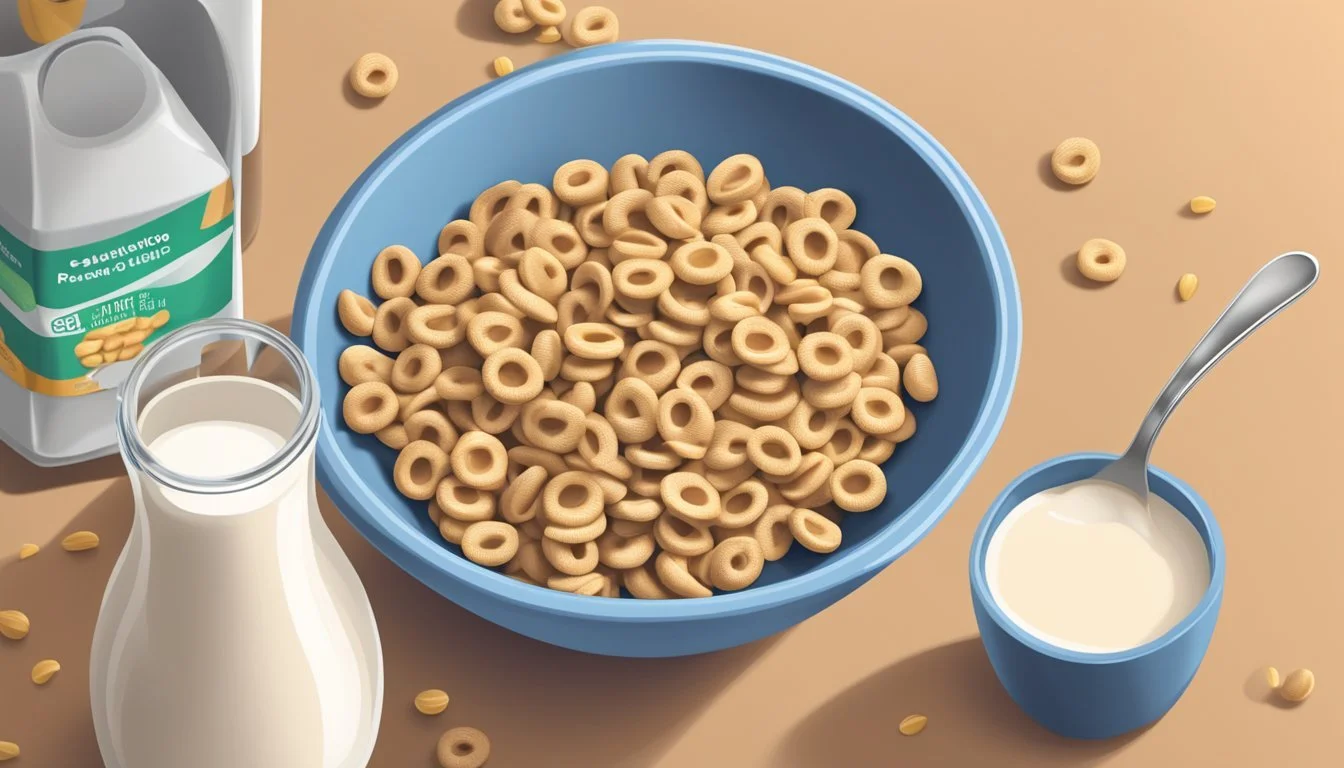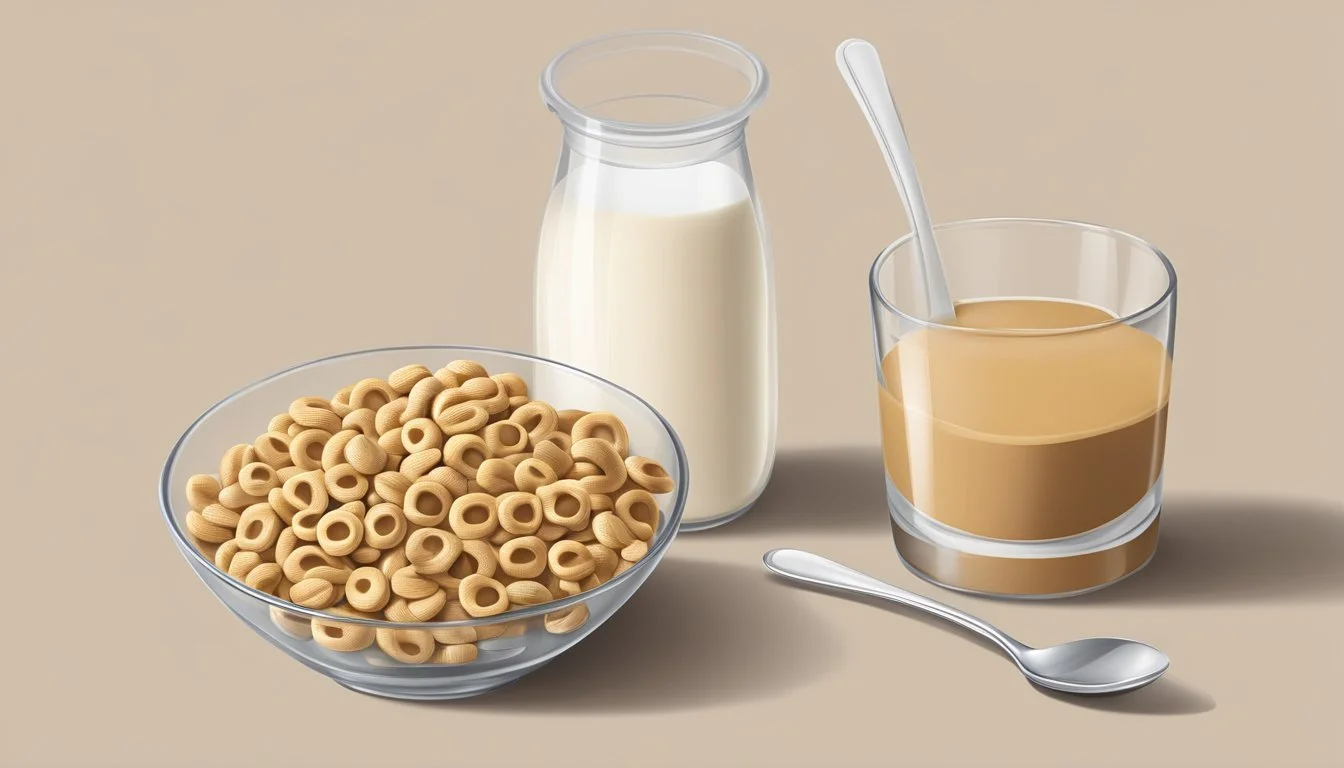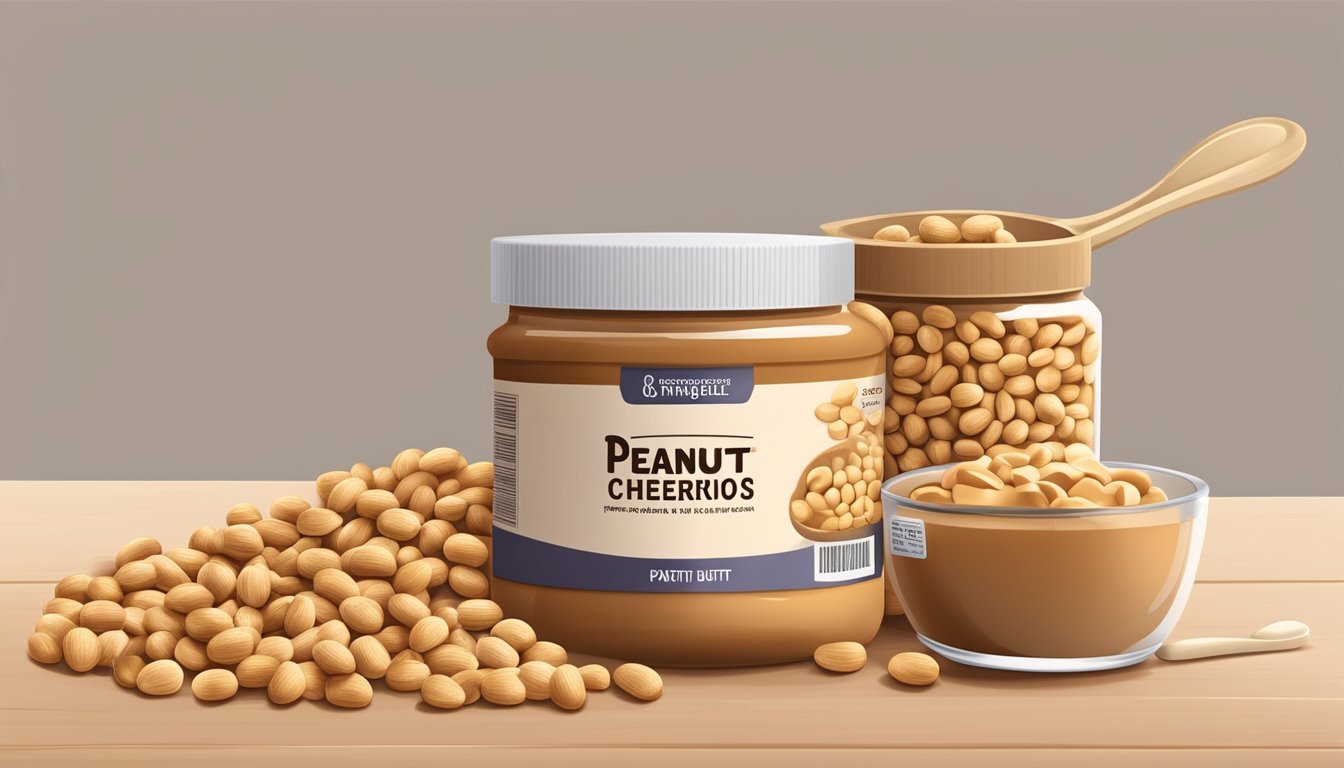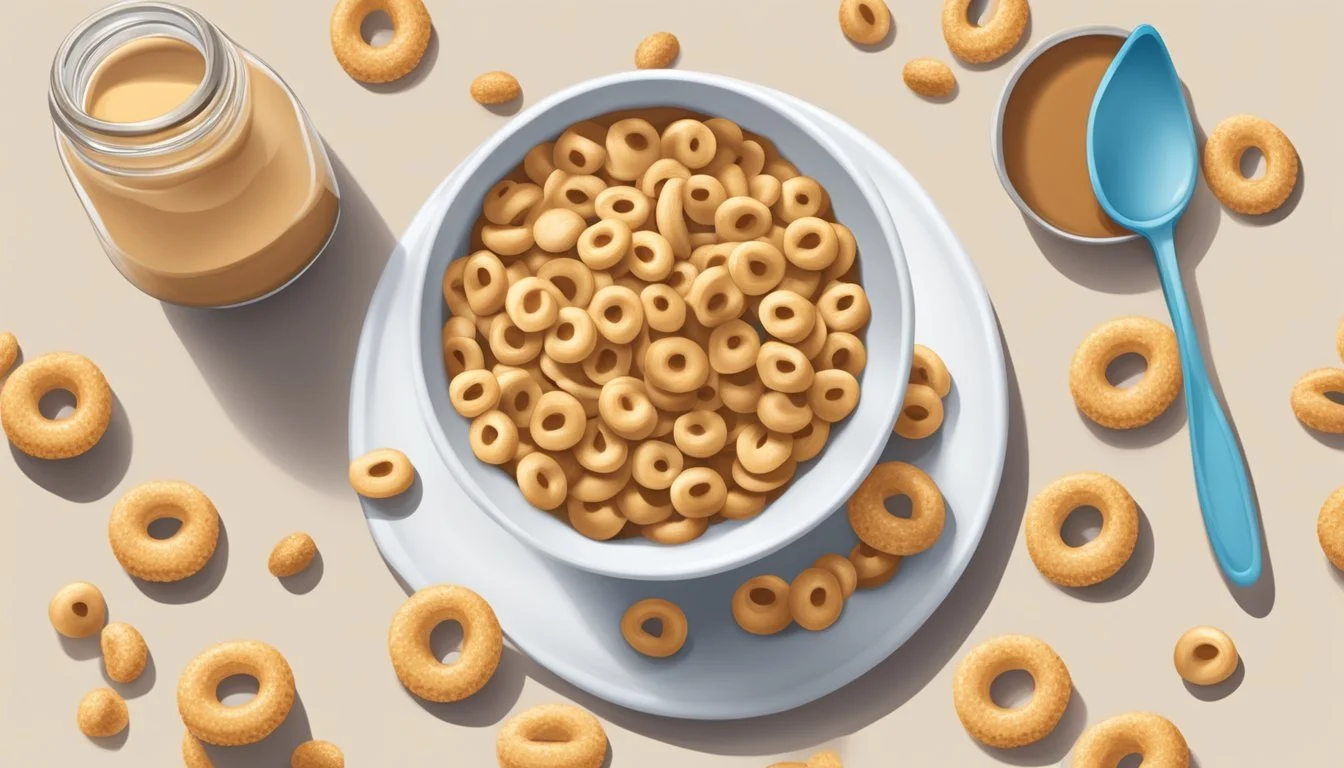Peanut Butter Cheerios Nutrition Facts & More
Key Facts for a Balanced Breakfast
Peanut Butter Cheerios offer a tasty twist on the classic breakfast cereal. This whole grain oat cereal combines the familiar O-shaped pieces with the rich flavor of peanut butter. A 3/4 cup serving of Peanut Butter Cheerios contains 110 calories, with a macronutrient breakdown of 64% carbohydrates, 27% fat, and 9% protein.
The cereal provides essential nutrients, including fiber, vitamins, and minerals. It serves as a good source of iron, supplying 56% of the Daily Value per serving. Peanut Butter Cheerios are also gluten-free, making them suitable for those with gluten sensitivities or celiac disease.
For those who enjoy a chocolate twist, Chocolate Peanut Butter Cheerios are available as well. This variety offers a similar nutritional profile with a touch of cocoa flavor. Both options provide a convenient and heart-healthy breakfast choice for children and adults alike.
Nutritional Profile
Peanut Butter Cheerios offer a blend of macronutrients, calories, vitamins, and minerals. This cereal provides essential nutrients while balancing taste and health benefits.
Macronutrients
Peanut Butter Cheerios contain a mix of carbohydrates, protein, and fat. The cereal's primary macronutrient is carbohydrates, making up about 64% of its caloric content. Protein accounts for approximately 9% of calories, while fat contributes around 27%.
Whole grain oats form the foundation of this cereal, providing complex carbohydrates and fiber. A serving typically contains 2-3 grams of dietary fiber, supporting digestive health.
The cereal's protein content, though modest, adds nutritional value. Its fat profile includes a mix of saturated, monounsaturated, and polyunsaturated fats, with peanut butter contributing healthy unsaturated fats.
Caloric Content
A ¾ cup serving of Peanut Butter Cheerios contains approximately 120 calories. This moderate calorie count makes it a suitable option for various dietary needs.
The calorie distribution aligns with the macronutrient breakdown:
Carbohydrates: ~77 calories
Fat: ~32 calories
Protein: ~11 calories
This balance provides energy without excessive caloric intake, fitting well into a balanced breakfast or snack option.
Vitamins and Minerals
Peanut Butter Cheerios are fortified with essential vitamins and minerals, enhancing their nutritional value. Key micronutrients include:
Iron: 56% of Daily Value (DV)
Vitamin A: 17% of DV
Vitamin B6: 26% of DV
Vitamin B12: 25% of DV
The cereal also contains smaller amounts of calcium, vitamin D, and other B vitamins like niacin and riboflavin. This fortification helps contribute to daily nutrient requirements, supporting overall health and well-being.
Zinc, magnesium, and phosphorus are present in varying amounts, adding to the cereal's mineral content. The combination of these vitamins and minerals supports various bodily functions, including immune health, bone strength, and energy metabolism.
Dietary Considerations
Peanut Butter Cheerios offer a range of nutritional benefits and potential concerns for various dietary needs. Understanding these factors can help individuals make informed choices about incorporating this cereal into their diet.
Gluten and Allergens
Peanut Butter Cheerios are gluten-free, making them suitable for individuals with celiac disease or gluten sensitivity. However, they contain peanuts, a common allergen. Those with peanut allergies should avoid this product entirely.
The cereal is processed in facilities that handle other allergens like tree nuts and wheat. Cross-contamination risks may exist for extremely sensitive individuals.
Heart Health
Whole grain oats, the primary ingredient in Peanut Butter Cheerios, can contribute to heart health. Oats contain beta-glucan, a soluble fiber known to help lower cholesterol levels.
The cereal is low in saturated and trans fats, which aligns with heart-healthy dietary recommendations. However, added sugars may be a concern for some individuals monitoring their cardiovascular health.
Diabetes and Blood Sugar
Peanut Butter Cheerios have a moderate glycemic index due to their whole grain content and added sugars. The fiber in oats can help slow digestion and stabilize blood sugar levels.
Portion control is crucial for individuals with diabetes. The serving size is typically 3/4 cup, providing about 22 grams of carbohydrates.
Protein from peanuts may help balance the carbohydrate content, potentially reducing blood sugar spikes.
Weight Management
A serving of Peanut Butter Cheerios contains approximately 120 calories. This can fit into various weight management plans when consumed in moderation.
The protein and fiber content may promote satiety, helping control appetite between meals. However, the added sugars could contribute to excess calorie intake if portions are not monitored.
For weight loss, combining the cereal with low-fat milk and fresh fruit can create a balanced meal while keeping calories in check.
Cereal Ingredients
Peanut Butter Cheerios contain a blend of wholesome and flavorful ingredients. Whole grain oats form the foundation of this cereal, providing essential fiber and nutrients.
Peanut butter is a key component, giving the cereal its distinctive taste. It adds protein and healthy fats to the mix.
Sugar and corn syrup contribute sweetness, while salt enhances the overall flavor profile. Brown sugar syrup may also be included for additional depth.
Some varieties incorporate cocoa for a chocolate twist. This adds richness and complexity to the taste.
Other ingredients may include:
Corn starch
Canola oil
Rice bran oil
Natural and artificial flavors
Vitamins and minerals (for fortification)
The exact ingredient list can vary slightly between regular Peanut Butter Cheerios and Chocolate Peanut Butter versions. Both aim to balance taste with nutritional value.
Artificial flavors are sometimes used to enhance the peanut butter taste. Dextrose may be added as a sweetener and preservative.
Special Varieties
Cheerios offers flavored variants beyond the classic oat cereal. These special varieties add new taste dimensions while maintaining nutritional value.
Chocolate Peanut Butter Cheerios
General Mills introduced Chocolate Peanut Butter Cheerios to satisfy sweet and savory cravings. This variety combines chocolate and peanut butter flavors with whole grain oats. A 3/4 cup serving contains 120 calories.
The cereal provides 4.5g of total fat, including 1g of saturated fat. It contains no trans fat and offers 2g of monounsaturated fat. Chocolate Peanut Butter Cheerios are a good source of iron, providing 56% of the daily value.
This flavor maintains the brand's commitment to whole grains. The first ingredient is whole grain oats. General Mills uses real cocoa and peanut butter for authentic taste.
Other Flavours
Cheerios offers several other flavored varieties. These include Honey Nut, Apple Cinnamon, and Frosted Cheerios. Each variant aims to provide a unique taste profile while retaining nutritional benefits.
Peanut Butter Cheerios, without chocolate, is another popular option. This flavor contains 110 calories per serving and is gluten-free. It provides essential nutrients like fiber, vitamins, and minerals.
General Mills also produces limited edition flavors periodically. These special releases often coincide with seasons or holidays, offering consumers novel taste experiences.
Consumption and Serving Suggestions
The standard serving size for Peanut Butter Cheerios is 3/4 cup (28 grams). This amount provides approximately 110-120 calories, depending on the specific variety.
For a balanced breakfast, pair a serving of Peanut Butter Cheerios with low-fat milk and fresh fruit. This combination offers additional nutrients and helps meet daily nutritional needs.
Peanut Butter Cheerios can be enjoyed as a quick snack straight from the box. A single serving contains about 8% of the Daily Value for fiber, supporting digestive health.
To add variety, use Peanut Butter Cheerios as a topping for yogurt or incorporate them into homemade trail mix. This versatility makes it easy to include the cereal in different meals throughout the day.
For those monitoring sugar intake, it's important to note that a serving of Peanut Butter Cheerios typically contains around 8 grams of sugar. This accounts for approximately 16-32% of the recommended daily sugar limit, depending on individual dietary guidelines.
When consuming Peanut Butter Cheerios, be mindful of portion sizes to maintain a balanced diet. The cereal can be part of a nutritious eating plan when consumed in moderation alongside a variety of other wholesome foods.
Brand Information
General Mills produces Peanut Butter Cheerios as part of their popular Cheerios cereal line. The company introduced this flavor variant to combine the classic Cheerios shape with the beloved taste of peanut butter.
Peanut Butter Cheerios feature whole grain oats as the primary ingredient. They aim to provide a nutritious breakfast option while satisfying peanut butter cravings.
General Mills offers Peanut Butter Cheerios in various sizes, including family-size boxes. The cereal is available in major grocery stores and online retailers across the United States.
The brand emphasizes the cereal's whole grain content and its potential role in a balanced breakfast. Peanut Butter Cheerios align with General Mills' commitment to producing cereals with nutritional benefits.
General Mills also produces a Chocolate Peanut Butter Cheerios variant. This flavor combines cocoa with peanut butter for those seeking a more indulgent breakfast experience.
The company regularly updates its product packaging and marketing to appeal to consumers. Peanut Butter Cheerios often feature eye-catching designs that highlight the peanut butter flavor profile.







